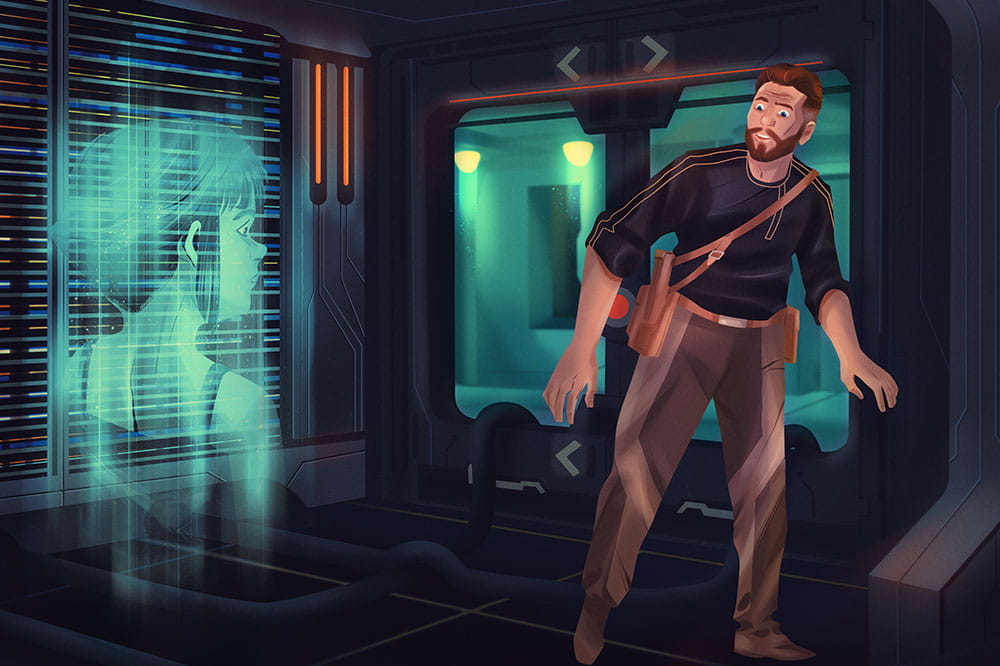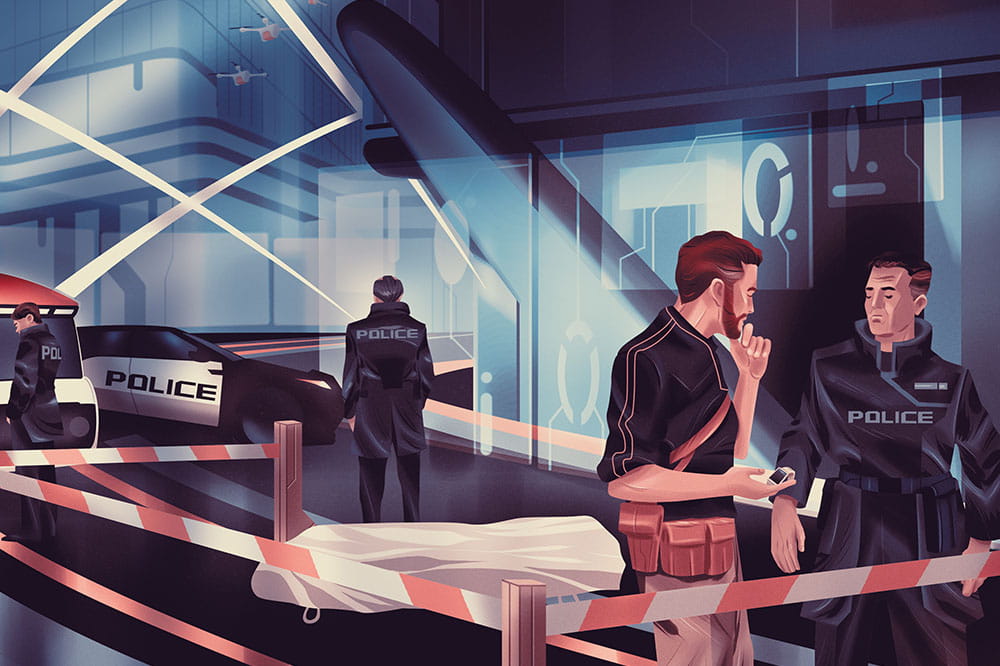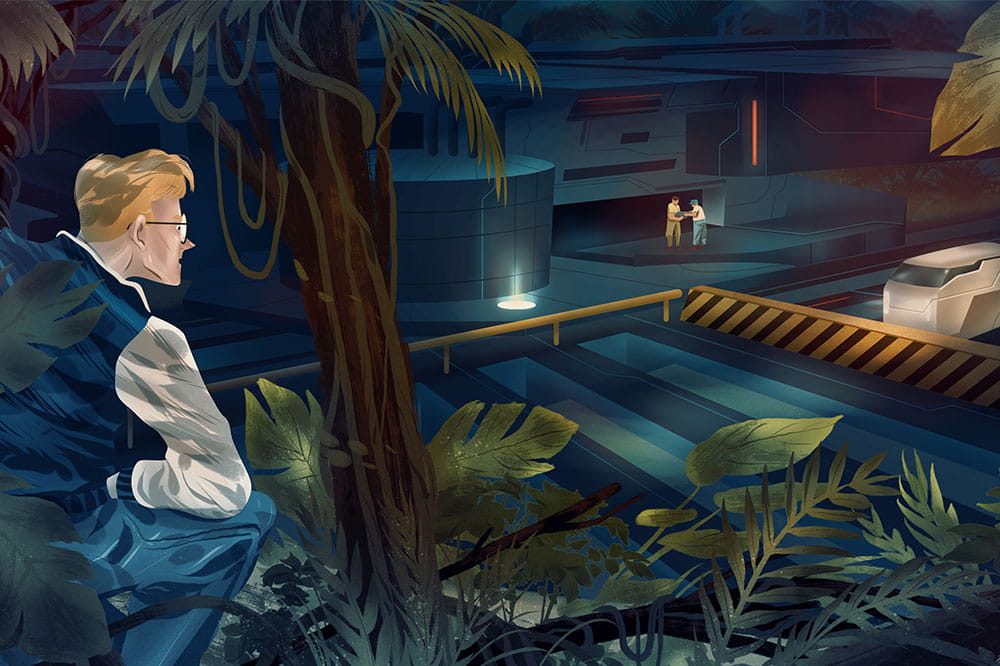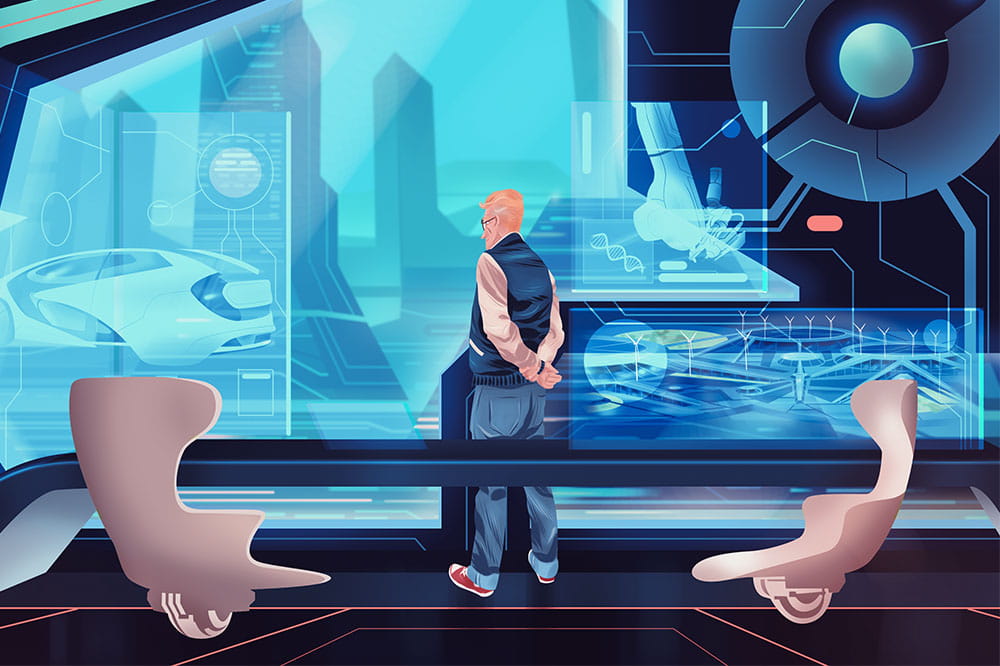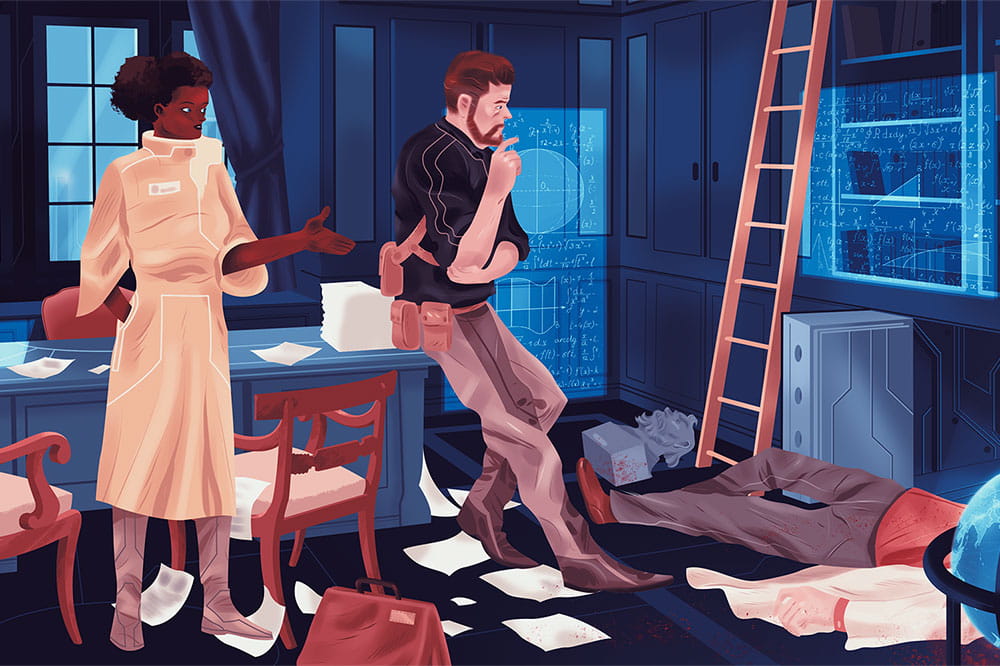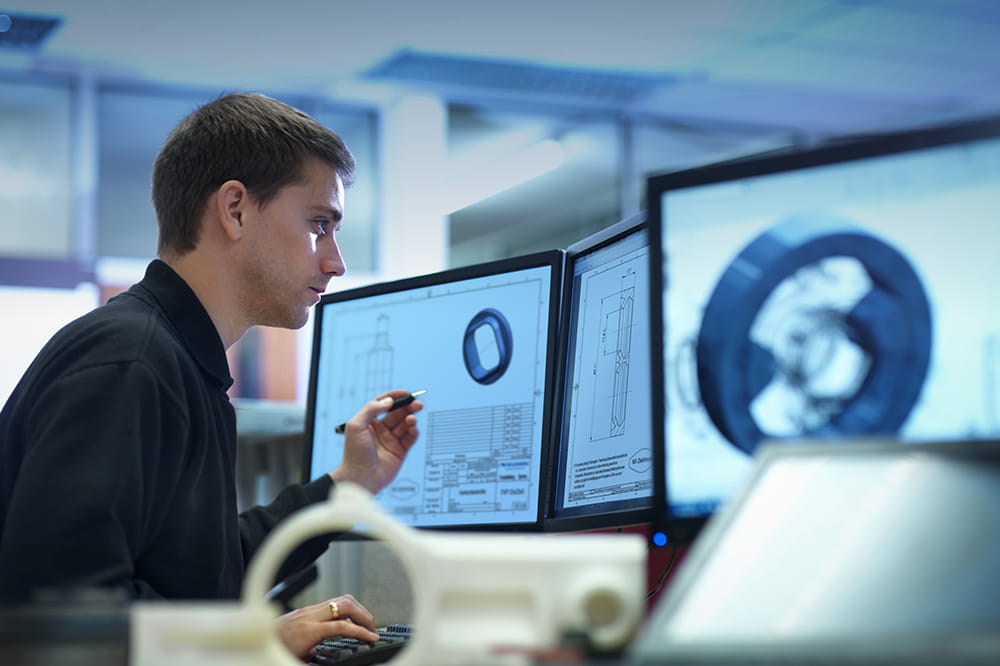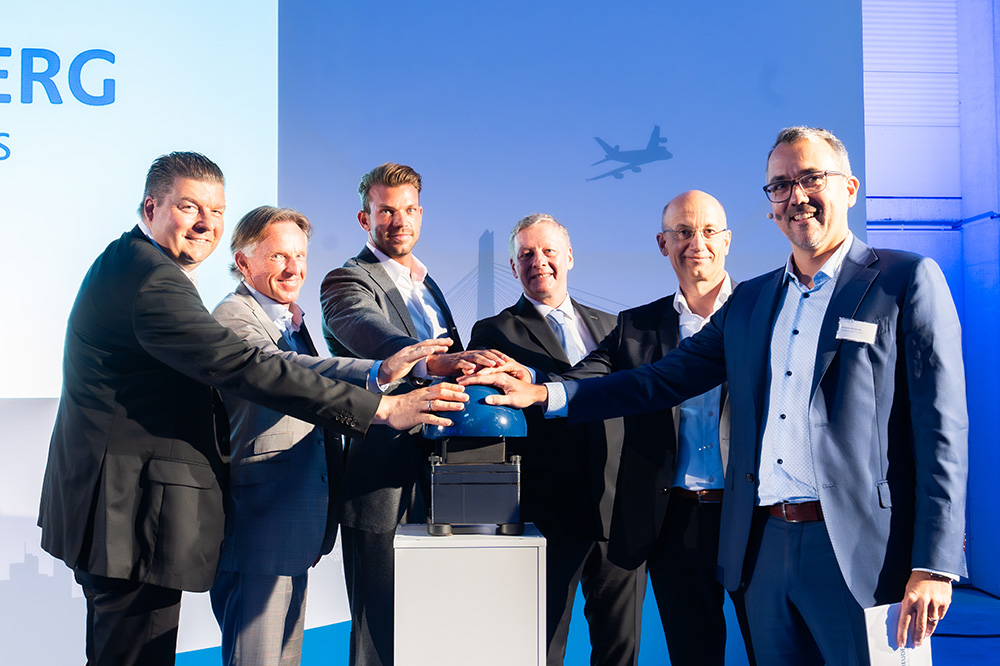Obtain news and background information about sealing technology, get in touch with innovative products – subscribe to the free e-mail newsletter.

19.07.2018 | Story
TRAVELING INTO THE FUTURE
Each month, you can find a new chapter in the ESSENTIAL science-fiction series “Trip into the Future.” In a fictional world where the goals of the Paris climate accord have become a reality, Nero, a blogger, explores the potential technological and social transformation resulting from it. The goal of the series is to play with fully different visions as creatively as possible and to take the reader along on a thought experiment: What might our future look like – and why is it important to us?
Short Science Fiction Stories: Part 13
Skewered
It looks like I won’t be getting any sleep again. As the reluctant hero who just foiled a cyber-attack, I am suddenly in demand. The problem: My biorhythms are completely shot. First, the time difference, and now all the interviews. I am sitting in my hotel room in a state of exhaustion. But I still can’t sleep. Could it be a good time to enjoy a true crime story to relax me? I was practically part of a crime story myself. Avar tells me that a new edition of my favorite series is out. Maybe the soft murmur of her voice will help calm me down.
“Some light would be nice.” “But you have light,” Xinyi replied. “I don’t mean the lamp on my forehead, but rather real light. Bright light. From the ceiling.” As Xinyi looked over, her headlamp shined into Cliona Aboud’s face. The young technician from the Intra-Logistics Department could not have been more aghast if Cliona had asked her to switch the sun on in the middle of the night. “We are in a warehouse, Cliona. There’s no light. Why is that? Vehicles with infrared sensors and other receptors don’t need light.” “I know,” she sighed. Her wristband vibrated, and a flashing dot appeared at the right edge of the hologram on her work glasses. “Watch out – forklift,” she warned her young colleague reflexively. But she had already stepped to the side. A red vehicle hummed as it went by. In the beam of their headlamps, the two glittering prongs looked like dangerous horns. Cliona tapped behind her ear with her right hand: “Main computer, identify the inventory drone’s last registered location,” she said. The screen in her work glasses became a map of the warehouse. A small, green rectangle lit up. Cliona looked around. “This is exactly where it disappeared,” she said. “I don’t see anything,” Xinyi answered. “It didn’t crash. Otherwise there would be debris.”

A Chance Find
Cliona turned her head back and forth, using her headlamp to illuminate the racks, which were 30 meters high. “The drone could be up there somewhere,” she said. Xinyi groaned. “That’s enough for me. We’re not going to find it. I didn’t study warehouse technology so I could climb on shelves and do physical labor – I just wanted to work with data streams and supply-chain algorithms. Watch out – forklift.” Another vehicle hummed slowly past them, stopped in front of a rack, and then extended its mast upward, to a point beyond the reach of the two women’s headlamps. At that dizzying height, it removed a crate from the rack and slowly lowered it. The vehicle made a clattering noise as it set off toward the automatic conveyor belt. In the darkness, the shadowy silhouette of rotor blades rose up from the crate. “I think you’ve found your inventory drone, Xinyi,” Cliona said.
A half-hour later, the two women sat in front of the screen wall at the warehouse’s intra-logistics control center. Columns of numbers were flickering, dots were flashing, and symbols were moving across the screens. In the dark, a mass of self-managing high-rack industrial forklifts, transport vehicles, drones and mini-shuttles worked their way monotonously but precisely through the aisles, a symphony of independent helpers armed with swarm intelligence. The picking system and packaging robots take charge of the crates and pallets in one-second cycles. At her workplace, Xinyi checked to see whether customers would receive their deliveries at the specified instant – or whether she should expect complaints about delays. “Everything seems to be in order,” she finally said. “We didn’t make any of the vehicles in the warehouse take time-consuming detours. We were lucky again. In a half-hour, an important load of polymers is heading to Japan. It just came in from Spain yesterday.” Cliona’s work glasses sent her the latest international news: an election victory for the “party of the future” in Europe, police searching for artwork stolen in Madrid, an earthquake in San Francisco… She turned off the newsfeed. “I still don’t understand why the drone crashed on top of the rack,” she said. “Wouldn’t it be great if it could video while it worked?” “What good would that do? It is totally dark. Its infrared scanner records the labels. That’s all it needs to do. You read the history books: Lighting in warehouses and plants once led to all kinds of unnecessary energy costs.”

“I’m going back in.”
Cliona chewed on her lower lip. “The dent in the side looked as though someone shot it down” “Who of us is supposed to have done that? It would only lead to trouble.” “Not one of us. Somebody inside.” Cliona pointed at the warehouse wall. Xinyi rolled her eyes: “Cliona, there’s nobody there. It is a warehouse.” “I’m going back in.” The intra-logistics technician shook her head. “You’re going without me. We can stay in radio contact. I’ll make sure that the routes don’t get tangled up.” Soon Cliona was standing in front of the rack again and looking up. “Watch out – forklift.” Xinyi’s voice grated in her in ear, but Cliona had already seen the warning about an approaching vehicle in her glasses. She looked at the high-rack forklift as it moved into position in front of the rack, extended its mast and slowly raised its prongs. On the spur of the moment, Cliona jumped onto them, If the drone on the rack was brought down just beneath the ceiling, did that mean someone was hiding up there? A burglar? Even if it was unlikely that someone would want to steal a sack full of a polymer compound. Standing shakily on the prongs, she rose higher. It was a good thing that it was dark – she already seemed to be awfully high in the air. “Hello, Cliona,” the computerized voice of the avatar in her head said. “Your body sensors are telling me that you are standing unsteadily. You should check to see whether you wore the right shoes today.” That’s all I needed, Cliona thought. Then she saw a light down below. It looked as though it came from a headlamp.
On the Trail…
“Xinyi?” Cliona said into the microphone. “Are you down there?” “Down there?” said the voice from the headphones, “You know very well where I am.” “Someone is down there.” “What do you mean, ‘down there,’ Cliona?” “Hmm. I may be going straight up.” The height gauge on her work glasses indicated that she was already nine meters in the air. The prongs suddenly stopped, and the mast swayed. “Cliona?” It was Xinyi’s voice. “Someone has manually turned off the electronic mast stabilizer on the forklift. Was it you? Why did you do that?” Uh-oh. “Could you please turn it on again quickly?” Cliona said into the microphone. Her voice may have quivered a bit. “And then call Security. There’s someone here.” The prongs began to move again. Everything was shaking and swaying as the mast continued its rapid climb. The height gauge showed twelve meters, then fifteen meters. She held on tight but, with her knowledge of physics, she knew that a mast with a full-grown woman was carrying too much weight at that height – it would swing from side to side without a stabilizer. If the vehicle below were to tip over… “I can’t switch the forklift off,” Xinyi said. “Where are you? Cliona was now sure that she was on the trail of someone or something. It would do her little good if she were right and that “someone” sent her crashing to the floor from this height. “Watch out!” her avatar – her constant non-physical companion – told her. “You are swaying badly. You may be drunk. Drink some water or lie down.” You have no idea, Cliona thought. Eighteen meters. Shouldn’t this stupid automated vehicle slowly realize that it could never retrieve a crate from the rack in its current state? And this is what we call artificial intelligence? The entire mast seemed to quiver and vibrate, thoroughly shaking Cliona. Her right foot seemed ready to slip.

The Leap
She pressed down hard with her left and jumped onto the racks. She landed with a clatter amid the crates and sacks, some of which plunged over the edge into the abyss. Her knee began to hurt. “Watch out!” her avatar said. “It looks like you fell. I will inform the nearest doctor in the area.&rdquo Cliona turned her head and let the beam of the headlamp move across the rack. A large, square object was sticking out of a crate a short distance from her. She scrambled towards it, pushing still other crates into the depths. If I don’t uncover a really important break-in, she thought, I can certainly kiss my job good-bye. Then she made it to the crate. The square object was very large and flat and seemed to be packed in paper. She ripped the package open. “Security is on the way,” Xinyi’s voice came through. “Where the heavens are you? What is going on?” Cliona took a deep breath: “Please call the police, too.” “Sorry, what was that?” “That art robbery the day before yesterday. In Madrid. I think someone smuggled the picture inside your shipment from Spain and wanted to recover it at our warehouse. And the inventory drone got in the way.” “Oh my God, Cliona! The guy is still in the warehouse? Hide before he finds you.” Cliona turned the headlamp off. “He can’t get to me where I am. Anyway, it’s dark in here.”
More Stories About Future Files
More news on the subject General

Join Us!
Experience Freudenberg Sealing Technologies, its products and service offerings in text and videos, network with colleagues and stakeholders, and make valuable business contacts.
Connect on LinkedIn! open_in_new